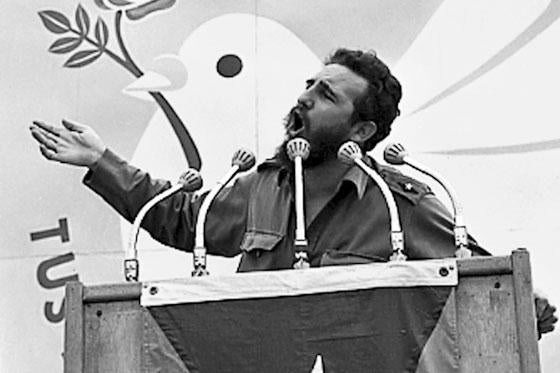
The ‘retirement’of Cuba’s Fidel Castro takes me back – in memory anyway – close to 50 years, when Castro’s attempts to overthrow the dictatorship of Fulgencio Batista was one of the big stories of the year.
In those days I was the Daily Mail’s ‘fireman’in New York, the reporter ready to rush off – like a fireman – to the big story of the day.
As a result, I spent many weeks in Havana in l959 covering the story of Castro’s efforts to topple Batista.
New Year’s Eve, 1959, was the moment Batista realised Castro was a real threat and decided to quit the country – taking with him much of his ill-gotten financial fortune.
Like many that New Year’s Eve, I spent the night celebrating with some of my colleagues. Unlike the scene in the movie The Godfather: Part II, made many years later, and depicting the events of that night, Batista did not make a formal farewell before he left for the airport in his limo. So few really knew he had fled Cuba. I got back to my hotel in the early hours.
As I rode up to my room in the elevator the operator said to me ‘Isn’t it fantastic?”What’s fantastic?’I asked. ‘Haven’t you heard? Batista has fled.’The phone in my room was ringing.
It was London. ‘Isn’t it fantastic?’a voice said. ‘Yes,’I replied ‘Batista has fled”. My thanks still go out to that lift attendant.
By the next morning the news had spread. There was chaos in Havana and the big question was: ‘Where’s Castro?’For about two days no one knew.
Then, in the bar of my hotel, I encountered an old friend and colleague, a writer for Agence France-Presse, named Buck Canel, whose office in New York was adjacent to mine. He said to me: ‘I think I know where Castro is. I’m told he’s in a little town called Matanzas, about 40 miles outside Havana.’Then he added: ‘I’m going out there. Do you want to come with me?’I didn’t hesitate.
We called for a taxi. I should, at this point, reveal that Buck Canel was very famous in South America – not as a reporter for AFP, but as the Spanish-speaking commentator for almost all the big baseball games in the US.
Anyway, we drove out to Matanzas. A small Spanish-colonial town with a typical town square surrounded by palm trees. We drew up in front of the town hall. Canel asked: ‘Is Castro here?’His voice was recognised immediately. ‘Si Senor… Si Senor Canel,’someone responded: ‘He’s upstairs in the mayor’s office.”
Accompanied by a growing crowd, all of whom seemed more interested in talking to my colleague from New York, we climbed the stairs.
The door to the mayor’s office was open. And there, sitting behind the mayor’s desk in his khaki fatigues, smoking, as I recall, a big cigar, was Fidel Castro.
There was a clamour in the room. I heard the name of my colleague being shouted. ‘It’s Buck Canel!”
Castro leapt to his feet. He rushed from the desk. Embraced Buck Canel – and they began chattering away in Spanish. Little of which I understood. I should mention that Castro was an avid baseball fan. At one time in his college days he even aspired to make a career in baseball.
The conversation, in Spanish, went on. I tugged at my colleague’s sleeve. ‘What’s he saying?’I asked. ‘Shush’replied Buck, ‘I’ll tell you later.”
After a few minutes they stopped, long enough for me to ask again: ‘What’s he saying?’To which Buck replied:’He wants to know why the referee in the last World Series gave a certain decision…’I was incredulous. ‘You’re talking about baseball?”Yes,’replied Canel. ‘He’s very interested.’
Then they began conversing again. Buck this time explained: ‘Castro wants to know what’s happening in Havana… who’s in charge? Who’s in control of the university for example… and the airport.’Buck assured him his supporters were in charge, but there seemed to be groups running wild, he admitted.
Then came the big question: Who’s in charge of the radio and TV stations? Canel knew that… he’d filed a report from the radio station that morning. ‘Your people,’he assured Castro. ‘You are sure?’Castro demanded. Reassured, he replied ‘If that’s so – let’s go.”
We descended the staircase. Castro climbed into the back of an old battered Jeep. We got back into our taxi, and off we headed for Havana, with a crowd of Cubans waving us on.
As we neared Havana, word seemed to have spread. The crowds by the roadside grew larger.
Once inside the city, our convoy, growing larger by the minute, headed straight for the main Cuban TV studios. Once there, Castro bounded from his jeep and disappeared inside. He went straight to one of the studios, and he told the technicians he wanted to be put on the air.
And so, for seven hours, Castro talked on the air to the Cuban people, without a break.
And that, I always say, is how Castro took Cuba.
Email pged@pressgazette.co.uk to point out mistakes, provide story tips or send in a letter for publication on our "Letters Page" blog
